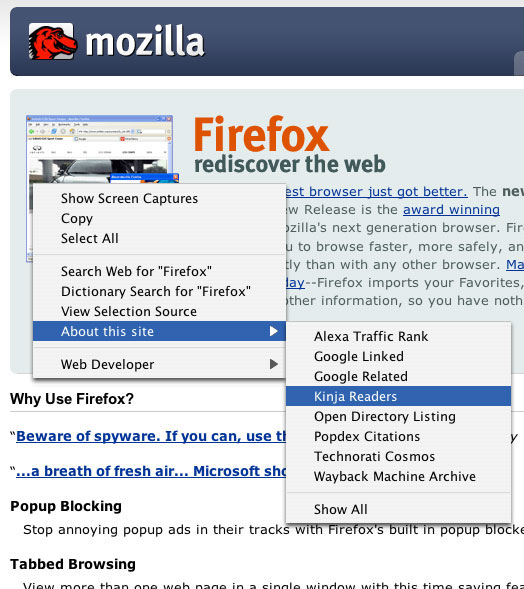MSN Bot Crawl Visual Animation
right click and choose zoom in to use timeline control
Used in reference to a post about Animated Search Engine Bot Crawl Visualizations by drunkmenworkhere
MSN Bot Crawl Visual Animation
right click and choose zoom in to use timeline control
Used in reference to a post about Animated Search Engine Bot Crawl Visualizations by drunkmenworkhere
These Animated Search Engine Bot Crawl Visualizations are the result of a one year experiment on the behaviour of Yahoo, MSN & Google search engine bots.
You can click on the pictures to watch the animated visualizations from drunkmenworkhere.



Quick Conclusion – For Google shorter URLs help rankings & comment spam does hurt rankings.
For you SEO types wistful for the days of chasing the green fairy, there is even a graphical visualization of pagerank in their test matrix.

The paths are similiar to natural forms. That fits with the idea that evolution is efficent search leading leading to winning forms. Perhaps we will find that the closer advanced visualizations resemble natural forms, that the visualization improves and/or the engines become.
Linkology is the “50 most linked to blogs relate” according to data derived from Technorati. What makes this interesting, is the implied assumption that these are 50 of the most important blogs.
When looked at from an SEO perspective, then the value is relatively obvious. However when looked at from a PR and/or effective reach perspective then suddenly the value plummets. Part of that is audience fragmentation although that would compare well with relevancy in SEO.
Going down the list, you can almost hear the apologist defences for why some of the sites are on the list. However, at the same time, these are the sites dominating Technorati.
If you are selling advertising for one of these sites, then being able to say you are the # most linked blog certainly is a useful way to raise the percieved value in the mind of a semi niave potential advertiser. Of course if you are able to command a certain price for it, then regardless of how well informed a buyer you have established a true market value.
The takeaway? Sometimes by making people think a resources is valuable, it actually becomes valuable. This is even easier to exploit when you have single source metrics.

“About This Site” is a plugin for Firefox that makes it easy to check:
* Alexa traffic detail and related sites
* Del.icio.us linkbacks
* Google related pages, cache and link information
* Kinja site readers
* Netcraft reports
* Open Directory site listing
* Popdex search for citations
* Technorati link cosmos
* Wayback Machine archive
* Whois query
* Yahoo linkdomain
This plugin to show metadata is very useful for SEO as well as SEM.
SEOmoz | Search Engine Ranking Factors
Here is a list of factors in SERPs, aggregated & weighted by a very respectable group of SEOs. Excellent reference for SEO.
Targeting Documents and Terms Through Co-Occurrence Datais a paper written by Dr. Garcia. In which he explains in detail how to choose which keyword in a two term phrase to focus on for SEO.
By way of example the phrase “car insurance” is analyzed, with the end result showing that it is better to target “insurance” as opposed to “car”.
Thus by focusing your efforts on the less competitive term, you can maximize your optimization for the two term keyphrase.
This has almost entirely replaced my use of the SEO Open plugin. It’s incredibly useful when exploring potential link partners for offpage optimization.
One of the most useful extensions for Firefox it will show you PageRank, Alexa Rank & now Compete Rank for each page.
Do yourself a favor. Close the door, turn on your speakers and devote seven minutes to watching this flash movie .
When I first came across this about a year ago it blew my mind. It’s a tiny bit dated, but still incredible. Go ahead, watch it now! (then read the rest of this post)
While I think some of the specifics are unlikely (or even silly) the examples of the New Media Economics and business models are brilliant. The personalized content meme is definitely out there.
Today at SEO Blackhat I saw a very interesting question tied to the Googlezon idea.
“Who is really pioneering the computer generated content, the rewording and content scraping technology of the Web?
Search engine spam technology keeps improving, so search engines keep evolving. The best SE spammers are the ones who provide as close to EXACTLY what the search engine is looking for as possible. The best search engine is the one that finds as close to EXACTLY what the user is looking for as possible. Therefore as search engines improve, SE spammers will have to evolve as well to deliver EXACTLY what the user is looking for, transforming them from a hated nuisance to a valued resource.
“Evolution has a nearly infinite multiplier on its search power and it just happens to invest its search effort in the mathematically optimal most efficient search allocation” link
Sometimes closing your eyes gets you exactly where you want to go. Evolution is blind, in that mutations occur without design. Yet even so, evolution produces the most optimal adaptation for any given environment over time.
“Evolution is an information processing system building vast database of information and synthesizing complex measurements of that information and doing an incredibly powerful search and mining of that information database to discover and refine improvements.” link
Sounds a lot like what some of the Big Boys and others are up to, as well as some of other players.
One of the obvious models that Search can learn from Evolution is consequences.
 In nature, adaptations/mutations have consequences. Constant feedback is provided by the environment using signals ranging from prosperity to death.
In nature, adaptations/mutations have consequences. Constant feedback is provided by the environment using signals ranging from prosperity to death.
The adult entertainment industry has been doing this for years via Toplists, TGPs (self sorting based on productivity), and partner accounts (symbiotic relationships).
Google is on the track with the toolbar voting buttons, and others like del.icio.us are even further along.
More accurate/efficient feedback means shorter cycles/generations which means less time to optimization.
Not many people bother to give feedback unless it is automatic, or they see immediate benefit from doing so. Personalization or Customization is terrific incentive for people to give feedback.
Maybe what Search needs is to introduce Death into the equation?